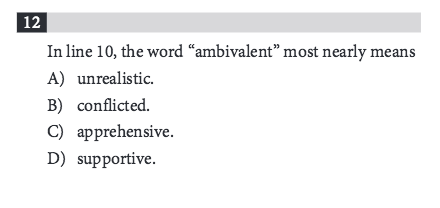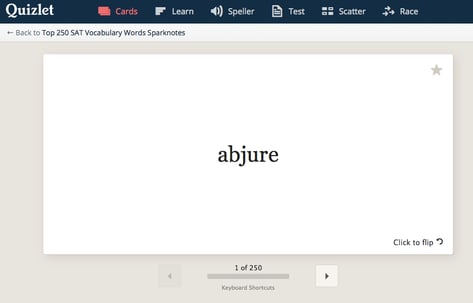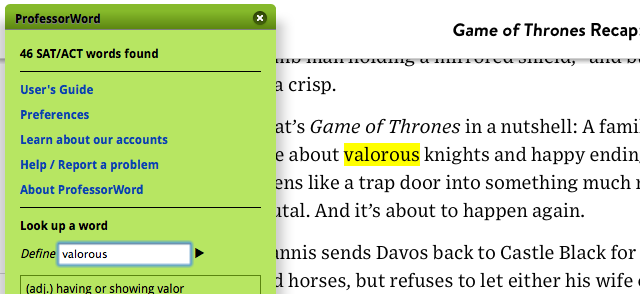
Need to study vocabulary for the SAT but aren’t sure where to start? We have links to the best free lists of SAT vocab from around the web.
We also have found other vocab study resources – from videos to apps to browser plug-ins – to help you study in the way that works best for you. Read on and conquer SAT vocabulary!
First Things First: Don’t Overdo Vocab
Before we jump into the resources, we have an important word of advice – don't overdo vocab studying for the SAT.
SAT Vocabulary is based on understanding words in context, in subjects ranging from literature to social science to science.
In other words, you won’t be expected to know the definition of a random word with no outside information. Instead, you have to figure out what a word means based on the information around it. So the best use of your study time is to learn high-value, medium-difficulty words, not to cram your head with lots of obscure vocabulary.
Be wary of any prep programs that promise to teach you “SAT Vocabulary,” especially ones with super long word lists (500 or 1000 words). This is a waste of your time! These programs are still based on the old SAT, which tested more obscure vocabulary.
That said, if you struggle with vocabulary in general, it can be good to do some separate vocabulary study to help you tackle the reading passages, some of which will be more difficult than on the old SAT.
For example, take a look at this question from an SAT practice exam:

Test question from SAT Practice Test 1.
If you don’t have a clue what the word “ambivalent” means, it might be hard for you to tackle the sentence and figure out what ambivalent means in this context. (For the record, Merriam-Webster defines ambivalent as “having a mixture of opposing feelings.”)
So how can you figure out if you need to do some dedicated vocabulary study, or if your existing vocabulary base is sufficient? Take a practice SAT, focusing on the Reading and Writing sections.
When grading your Reading answers, if you missed half or more of the vocab questions (the ones that begin “as used in line __, the word ____ most nearly means…”) then you should make studying vocabulary a priority.
Furthermore, when correcting the other Reading questions, try to figure out why you got them wrong. (Learn more about getting the most out of practice tests.) If you notice you’re missing questions because you misunderstood a word or phrase, either in the passage or the question, it could also be useful to get some SAT vocabulary under your belt.
Finally, keep an eye out for the “precision” questions on the Writing section. These questions have you compare different word choices, for example “therefore,” “thus,” “moreover,” and however,” and pick the one that works best in the passage. Again, you need to be able to understand how a word’s meaning works within a sentence to get these right.
If you take the practice test and only miss a few or none of the Reading vocab questions, and none of the Writing precision questions, and your wrong answers are due to different issues (timing, misunderstanding the passage’s larger meaning, etc) then do not spend time studying vocab! Focus on your other weak areas. (Check out our ultimate study guide for SAT Reading for ideas.)
But if you do struggle on any of those questions, check out the vocabulary lists below to help you learn high-value words for the SAT.
SAT Vocabulary Word Lists
If you’ve decided that you need to work on SAT vocab, we recommend using these vocab lists. They focus on common, easy-to-moderate difficulty SAT words that are most likely to be tested.
They also don’t overemphasize vocabulary – none of these lists is longer than 200 words. Remember that spending hours memorizing vocabulary is not an efficient use of study time for the SAT.
Start by learning one word list, then take another practice test. If you're still struggling with the vocabulary questions, move on to the next list.
- PrepScholar's 200 SAT Words
- PrepScholar's 150 Top ACT Words
- Scholastic's SAT/ACT Top 100 Words
- Kaplan's 100 Most Common SAT Words*
*Save this list for last, because it contains more difficult words that are less likely to be tested on the current iteration of the SAT. However, these are still good words to know because they could be used in the more difficult reading passages.
You can make your own flash cards to study these words, or check out the resources below for virtual flash cards and other learning resources. Happy studying!

Flashcards, Games, and Other Resources
Beyond just giving you word lists, we also wanted to give you some more tools to learn vocabulary. These are a few resources that are also free and can help you learn SAT vocab. I chose a range of websites to help different kinds of learners. All of these are great resources, and you should use them if you find them helpful.
In general, when you are looking for SAT vocab resources, avoid services promising to teach you more than 500 words (too much time) or any services you have to pay for (not worth it given the amount of free resources). If you have any resources that are helpful for you, feel free to share them in the comments!
Quizlet
This is an online flashcard website. If you make an account, you can use their website and also their mobile apps for iPhone and Android – meaning you can study your SAT vocab on the go!

If you're anything like me and hate hand-writing flash cards, this app will be your best friend. Image via Quizlet.
This app is handy because as you review words, you can star cards that you are struggling with, allowing you just to focus on your weak spots.
You can either make your own card sets focusing on problem words or search pre-made lists. For example, here’s the Kaplan top 100 list from above!
I personally used this app all the time in college for my language classes and found it very helpful. I highly recommend using it to study your SAT vocabulary.
ProfessorWord
This is an app for your web browser that highlights SAT/ACT vocab words from articles and web pages and defines them for you.
This is really cool because if you like to read articles from publications like The New York Times, The Atlantic, or Wired, it’s likely you’re encountering SAT vocab words in your daily reading anyway. This app just goes through and points them out so you don’t miss them! This is a great way to learn words in the context of your day-to-day web browsing. Especially given the SAT's focus on understanding vocabulary in context, I highly recommend using ProfessorWord to find and study vocabulary.

For the best practice, run ProfessorWord and check out the highlighted words on the web page. Before you click on the word to see the definition, quickly jot down (either on a piece of paper or in a NotePad document) what you think the word means, based on how it's used in the article. Then, check out the official definition. Compare your guess with the official definition and see how close you got. If you do this exercise a few times a week, you will improve your ability to figure out a word's meaning based on its context, plus, you will generate a list of SAT words to study. Win win!
Vocab Ahead
If you like words explained out loud, check out the videos at Vocab Ahead. These videos are really helpful for students who learn best by hearing rather than reading, or by having concepts explained to them.
Head to the “Study Room” tab and select “SAT 300 Common” from the drop down menu. The videos for each word last about 30 seconds, and incorporate a definition and at least one example. This is also a great resource if you have a particular word you are struggling to understand based on its dictionary definition alone.
Vocab Sushi
If you like online quizzes, Vocab Sushi is a website that lets you test your vocab knowledge with quizzes and teaches vocab words by using them in sentences from actual news stories. This is a great way to learn new words through real-world examples, rather than just dictionary definitions. Give this website a shot if you struggle with memorizing basic word definitions and/or if you want more practice learning vocabulary based on its context.
What’s Next?
Struggling with SAT Reading practice sections? Learn how to stop running out of time on SAT reading. Also, check out our ultimate SAT Reading study guide. It will teach you the content, skills, and tips you need to improve your SAT Reading score.
Learn more about vocabulary on the SAT, including how it changed from the old SAT.
Not sure what score to aim for on the SAT? Learn how to come up with a target score for the SAT based on the colleges you want to attend.
Want to improve your SAT score by 160 points? We've written a guide about the top 5 strategies you must be using to have a shot at improving your score. Download it for free now:
Have friends who also need help with test prep? Share this article!

Halle Edwards graduated from Stanford University with honors. In high school, she earned 99th percentile ACT scores as well as 99th percentile scores on SAT subject tests. She also took nine AP classes, earning a perfect score of 5 on seven AP tests. As a graduate of a large public high school who tackled the college admission process largely on her own, she is passionate about helping high school students from different backgrounds get the knowledge they need to be successful in the college admissions process.


































 Holly R.
Holly R.